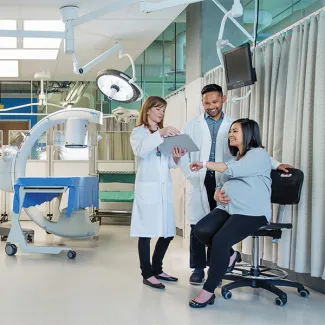Overcoming the healthcare crisis: a call for bold leaders

By Dr. Cheryl Segaric, former Director of the Master of Health Leadership and Policy in Clinical Education
We are in a healthcare crisis.
We’ve been in this state for some time now, but the impact of the COVID-19 pandemic over the past few years has brought into sharper focus the issues and challenges facing the sector.
It doesn’t need to be this way, and we can, as a collective, transform this crisis into an opportunity. Doing so will require bold leaders who can imagine new ways of doing things and who have the skills to implement much-needed changes across the system to ensure we are providing quality health care for all.
Innovative Healthcare Leadership Strategies for the Future
The top-down approaches of the past aren’t working.
What I’m hearing is the profound need to break down silos and bring together patients, advocates, government and practitioners from all the various healthcare disciplines. We need to learn how to listen to one another and work together in ways that more effectively facilitate and support stronger collaborative efforts toward innovative and affirmative action for health improvement. This is where the need for leadership is so essential.
One of the goals of the Master of Health Leadership and Policy in Clinical Education program is to push students to think critically, ask hard questions and look at the full picture.
That’s how you become a leader in healthcare capable of imagining and implementing the changes needed to move the system in a new direction.
Communication skills are key.
We need healthcare leaders who have the skills to communicate and coordinate effectively within and across organizations and disciplines. For me, that is where this program can be transformative: we support students to develop their knowledge and skills to be even more effective leaders.
Preparing Future Healthcare Leaders: A Holistic Learning Experience
The courses taught through the School of Nursing expand students’ knowledge of health, wellness and health delivery systems, equipping them with advanced leadership and organizational management skills.
To broaden students’ awareness of the challenges across different contexts, we bring in experts in the field – from the Ministry of Health and in practice – to share their insights.
The practicum experience, which is a requirement of the program, also opens up opportunities for students to connect with industry leaders and apply their skills in a specific area they are passionate about.
The knowledge our students obtain in the business courses taught through Sauder also plays an important role in their leadership development.
Learning about strategic planning, for example, enables students to get to the root of issues and then map out and develop workable strategies to implement innovative solutions.
Preparing Healthcare Leaders to Tackle Societal Challenges
This interdisciplinary focus provides a strong lens through which to understand difficult and complex challenges within the healthcare system – including Indigenous cultural safety, anti-racism, substance use and addiction, the impact of climate change and more. Students develop a broad awareness of the internal and external factors that impact these issues and are able to identify the data they need to make informed decisions.
As our students graduate and move into the next stage of their careers, I see incredible opportunities for them. There is such a profound need for both educators and leaders in health care, and they are well equipped to step into those positions – using their knowledge and critical-thinking and communication skills to lead change.






